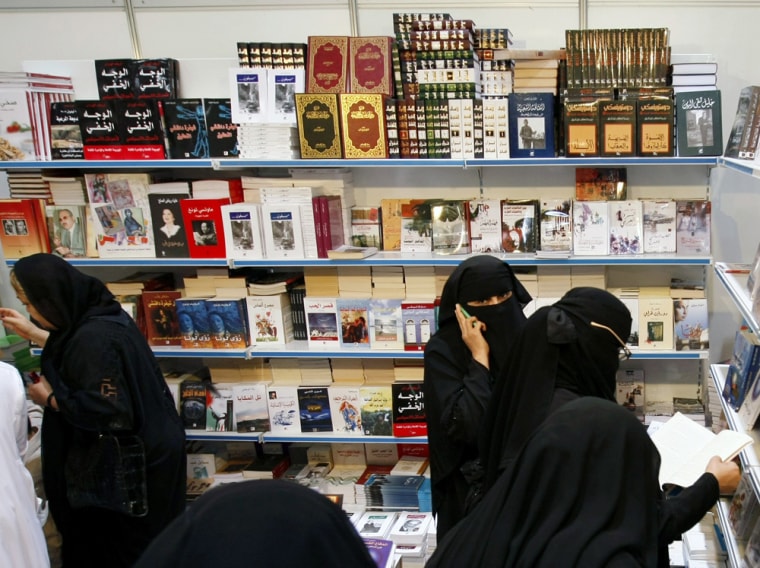When word spread that Brazil was going to be the guest of honor at the Riyadh International Book Fair, a Saudi official had to reassure the public that the Brazilians wouldn't be dancing the Samba at the 11-day event that opened recently.
The question to Abdul Aziz Al-Subeil, a senior Information Ministry official, at a news conference last week reflected the wariness with which cultural events are viewed by many here. For conservatives, book fairs, plays and movie screenings are a cause for concern because they allow for the mixing of the sexes, the playing of music and the introduction of books that they believe violate religious and moral values.
Still, despite the regular interruption of cultural activities by men who sometimes claim to belong to the religious police, there has been a marked increase in such events in the past few years.
One of the most groundbreaking was a concert held by the German Embassy last year at a government-run cultural center that broke many taboos in a country where public music is banned, public concerts are almost never heard of and the sexes are segregated even in lines at fast food outlets.
The other was the first Saudi film festival, held last year and attended by the information minister in a clear sign of official support for the event.
In a first this year, women have been given more access to the book fair, which opened Tuesday. In the past, female visitors were restricted to only two half-days. Many hoped this move would correspond with less interference by the religious police to stop what they view as excessive mixing of the sexes.
Presence of religious police
But well-known columnist Haleema Muthaffar said she was shocked when the religious police stationed five security guards, six policemen and two religious police agents between her and the men and women who attended her book signing to prevent men from coming forward to have their books signed.
She said the religious police detained three well-known Saudi writers for questioning after she tried to give one of them a signed copy of her book.
"What kind of encouragement for culture is this?" she wrote in Al-Watan newspaper.
She said culture is cordoned off "in a way that scares those who seek it and deters them from getting close to us."
Many other conservatives have made headlines recently trying to stop the kind of cultural opening supported by many Saudis. Last month alone, newspapers reported the following incidents:
- Bearded extremists tried to stop a play in Riyadh. As music blared signaling the beginning of the show, one of the men decided to give a religious lecture on stage. The man was stopped by the stage manager, and following a brief argument, he left with his companions.
- Bearded youths attacked dancers at the Desert Spring Festival in the southern town of Sharoura, forcing organizers to cancel the all-male traditional dance show.
- In the western city of Jiddah, five youths tried to disrupt the screening of movies at a spring festival by urging visitors to stay away from the cinema. There are no movie theaters in Saudi Arabia, but recently films have been screened at auditoriums and other venues.
The Commission for the Promotion of Virtue and the Prevention of Vice, which runs the religious police, has issued statements distancing itself from the incidents. The police are charged with enforcing the strict interpretation of Sunni Islam followed in the kingdom.
Columnists speak out
Columnist Hamoud Abu Taleb questioned how long such actions by conservatives can continue "since they have become increasingly violent and aggressive."
"Keeping silent about this behavior poses a great danger not only to the cultural institutions, but to society itself," he wrote in Al-Madina newspaper.
Another columnist, Ali al-Moussa, said concerns about the corrupting influence of cultural events have been overblown in Saudi Arabia. He said Brazilians should be able to dance the Samba at the book fair if they wanted.
"Haven't we danced the (Saudi traditional sword dance) at fairs in Paris, London, Moscow and Washington?" he wrote in Al-Watan newspaper. "Why should we dance in others' arenas and condemn their presence in ours?"
For those who want to enjoy shows in peace, there are piano recitals, standup comedy routines and plays performed on embassy grounds or in expatriates' residential compounds, venues that are off limits to religious police and extremists. The shows are not always open to Saudis, though.
One recent event featured Sue Ott Rowlands, dean of the College of Liberal Arts and Human Sciences at Virginia Tech. She performed Pulitzer Prize-winning playwright Tony Kushner's hourlong monologue "Homebody/Kabul."
Rowlands said performing the play in Saudi Arabia "was an extraordinary experience."
Yasmin al-Tuwaijri, a Saudi epidemiologist who attended one of Rowlands' performances, said she enjoyed the show but had one concern in the back of her mind.
"I was extremely thrilled to have such an occasion, but I was nervous that somebody would come and ruin it," said the 42-year-old woman.
